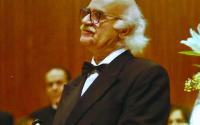January 31, 2005
Perhaps the second intifada has come to an end. Perhaps the cease-fire in the Gaza Strip will develop into a general, mutual cease-fire.
For me, the words "cease fire" have an extra resonance. When I was a soldier in the 1948 war, I twice experienced what it means to wait for a cease- fire. Each time we were totally exhausted after heavy fighting in which many of our comrades had been killed or wounded. We hoped with all our hearts that a cease-fire would really come into effect, but did not allow ourselves to believe in it. In both cases, a few minutes before the appointed hour, along the whole front line a crazy cacophony of firing erupted, everybody shooting and shelling with everything he had. To attain some last-minute advantages, as it appeared afterwards.
And then, suddenly, the shooting stopped. An eerie quiet settled in. We looked at each other and left unspoken what we all felt: We are saved! We have been left alive!
I understand, therefore, the feelings of the fighters on both sides, who are now hoping that the mutual cease-fire will come into effect and hold. After four and a quarter years of fighting, everybody is exhausted.
The first question at the end of the fighting is: Who won?
Naturally, each side will claim victory. The Palestinian organizations will assert that it was only the Qassam rockets and the mortar shells which compelled Israel to agree to a cease-fire. The Israelis will claim that the Israeli army has crushed terrorism and compelled the Palestinians to give up.
So who won? In fact, nobody. The fighting ended in a draw. The Israeli army has not won, since it did not succeed in putting an end to the attacks, much less in "destroying the terror infrastructure". On the eve of the cease-fire, the Qassam rockets and mortar shells have turned life in the town of Sderot into hell. The inhabitants don't hide that they are nearing the breaking point.
Moreover, the organizations reached a new level by undertaking more complicated attacks, real guerilla actions. The destruction of the army outpost on the "Philadelphi axis" involved blowing up a tunnel beneath it and storming the post on the ground. Similarly, the attack on the Karni checkpoint combined the explosive demolition of a wall with an attack by fighters. These actions were reminiscent of those of the Irgun and Stern Group in the last years of the British mandate.
Our army had no answer to the Qassams and the guerilla actions. Haven't they tried everything? Brutal incursions. Shelling by tanks, killing fighters and bystanders. Demolition of thousands of homes. Targeted assassinations.
Nothing helped. There remained only the method advocated on TV by Israel Katz, a cabinet minister: to bomb and shell the Gaza Strip towns, open the border to Egypt in one direction and drive hundreds of thousands of inhabitants out into the Sinai desert. (That is what Moshe Dayan did to the Suez canal towns during the War of Attrition, in the late 1960s.) It has been reported that Ariel Sharon himself proposed, after the Karni incident, the bombing of towns and villages in the Gaza Strip. But nowadays this is not possible: neither the Israeli public, nor world public opinion would stand for it.
The simple truth is that the generals are bankrupt. But they have no reason to feel ashamed: no other army has won such a contest in the last hundred years. The French in Algeria arrived at the same point, in spite of torturing thousands of men and women. The same happened to the Americans in Vietnam, in spite of burning down dozens of villages and massacring their inhabitants. Even the Nazis did not succeed in putting down the French resistance, however many hostages they executed.
Our generals, like all the generals before them, made the understandable mistake of thinking in terms of war. But this was no conventional war. A war is a confrontation between armies, and it is fought with methods that have evolved throughout the ages. The confrontation between an army of occupation and resistance forces is quite different. The factors governing that are not taught in officers' courses.
True, the Israeli army tried to improvise, with some success. But it could not win. Because victory means breaking the will of the opponent to resist. And that did not happen. If that is so, did the Palestinian fighting organizations win?
Interestingly enough, this questions is not posed openly, not even by the Palestinians themselves. First of all, because the idea has been accepted throughout the world that the Palestinian resistance is "terrorism", and who would dare to assert that terrorism had won? The more so since the Palestinians – like the Israelis – committed fearful atrocities.
Also, the propaganda war between Israelis and Palestinians is a kind of world championship of victimhood. Each side presents itself as the ultimate victim. Each side publicizes pictures of dead children, weeping mothers, demolished homes.
Because of this, the Palestinian spokespersons do not boast of the fighting of their compatriots. They avoid pointing to the thousands of their fighters who sacrificed their lives, the children who confronted the tanks, the hundreds of commanders who were "liquidated" and for each of whom a substitute was found, for whom in turn a substitute was found, and so forth. About this, books will be written, songs will be sung, tales will be told in future generations.
Another fact: Palestinian society has not been broken. Israeli tanks roam their streets, hundreds of roadblocks prevent movement from village to village, the economy is shattered, most men are unemployed, hundreds of thousands of children suffer from malnutrition. And in spite of this, miraculously, Palestinian society continues functioning somehow, life goes on, fatigue and exhaustion have not forced it to surrender.
Does this mean that the Palestinian side has won? The organizations can claim that Sharon would not have talked about withdrawal from the Gaza Strip and evacuation of the settlements there if the attacks had not taken place. That is certainly true. But Sharon has not yet begun to consider leaving the West Bank. On the contrary, the settlement activity there is reaching new heights and the land grab is in full swing in the shadow of the "separation fence". One cannot call that a Palestinian victory. All this points to a deadlock. The Israeli army knows that it cannot vanquish the Palestinians by military means. The Palestinians know that they cannot throw off the occupation by military means.
For the Palestinians, a draw is a huge achievement. The inequality between the two sides is immense. If one takes into account only the strength of arms and the size of forces, without considering the moral factors, the Israeli advantage is astronomical. In such a situation, a draw is a victory for the weak.
We should admit this without hesitation. It is not wise to present the Palestinian side as if it were beaten and broken. Not only because this is untrue, but also because it is dangerous. The boasts of the army propagandists, as if Abu Mazen has folded up under Israeli pressure, are at best stupid, and at worst they are intended to demean and provoke the Palestinians to new violence (or to acts of madness). The Egyptian victory at the beginning of the 1973 war set the scene for Anwar Sadat to make peace with Israel. The Palestinian pride in their steadfastness can make it more acceptable for them to keep the cease-fire.
Now, both sides are exhausted. Palestinian suffering is manifest. Israeli suffering is less obvious, but, nonetheless, real. The costs of the occupation amount to tens of billions, hundreds of thousands of Israelis have sunk beneath the poverty line, the social services are collapsing, foreign investment has not recovered, the level of tourism is pitiful. And, more importantly: during the intifada, 4010 Palestinians and 1050 Israelis have lost their lives. That is the background of recent events. Both sides need the cease-fire.
But a cease-fire is only an interlude, not peace itself. If wisdom prevails in Israel (since it is the stronger side) negotiations for a final settlement will start at once, with the general aim agreed in advance: a Palestinian state in all the territory of the West Bank, the Gaza Strip and East Jerusalem.
If wisdom does not prevail (and in politics, the victory of wisdom would be something new), this cease-fire will end up like many before: just an interval between two rounds of fighting.
We are faced with a road sign pointing in two opposite directions: one end directed towards peace, the other towards the next violent confrontation






